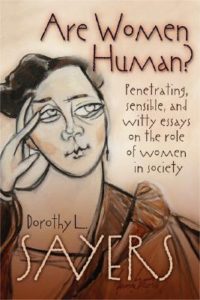I prefer to think that women are human
 Are Women Human? Astute and Witty Essays on the Role of Women in Society
Are Women Human? Astute and Witty Essays on the Role of Women in Society
by Dorothy L Sayers
I thought this would be an appropriate review to publish on International Women’s Day. As the title suggests, this tiny volume is a pair of pieces by Sayers on women’s rights – an address given to a women’s society in 1938, and an essay first published in 1947.
I was a little frustrated by Sayers dismissing feminists as too extreme while arguing the case for women being individuals. But in general she finds smart, astute ways to explain how men, and society in general, treat men as human individuals and women as identical members of a stereotype.
“Are women really not human, that they should be expected to toddle along all in a flock like sheep? I think that people should be allowed to drink as much wine and beer as they can afford and is good for them; Lady Astor thinks nobody should be allowed to drink anything of the sort. Where is the “woman’s point of view”? Or is one or the other of us unsexed? If the unsexed one is myself, then I am unsexed in very good company. But I prefer to think that women are human and differ in opinion like other human beings.
Almost every line is quotable – even the ones I disagree with are written with wit and clarity. A few of her arguments now seem old-fashioned, but disappointingly, a lot of what she talks about is salient today. Perhaps now women aren’t scorned for wearing trousers, but there are still strong feelings about male and female professions and behaviours.
“Probably no man has ever troubled to imagine how strange his life would appear to himself if it were unrelentingly assessed in terms of his maleness; if everything he wore, said, or did had to be justified by reference to female approval…If from school and lectureroom, press and pulpit, he heard the persistent outpouring of a shrill and scolding voice, bidding him remember his biological function.”
I learned a few historical tidbits from these essays. On reflection, it is of course true that before the industrial revolution, jobs such as spinning, dyeing, weaving, brewing, distilling, preserving, pickling, curing meat, milking and producing dairy products were largely performed by women in their homes but when all those jobs were industrialised they were taken over by men. And Sayers also makes the point that for centuries women managed households – controlling finances, hiring and firing – yet early 20th century society refused to see women as suitable managers in workplaces.
But Sayers’ main point is that men are allowed to have human needs, such as preferences based on physical comfort, while women are expected to only have needs that relate to their femaleness. I had never heard this articulated quite so clearly before, and it is a really good articulation of how the sexes continue to be unequal. Sadly.
First published 1947 in the collection Unpopular Opinions.
Source: Birthday present from my Dad.